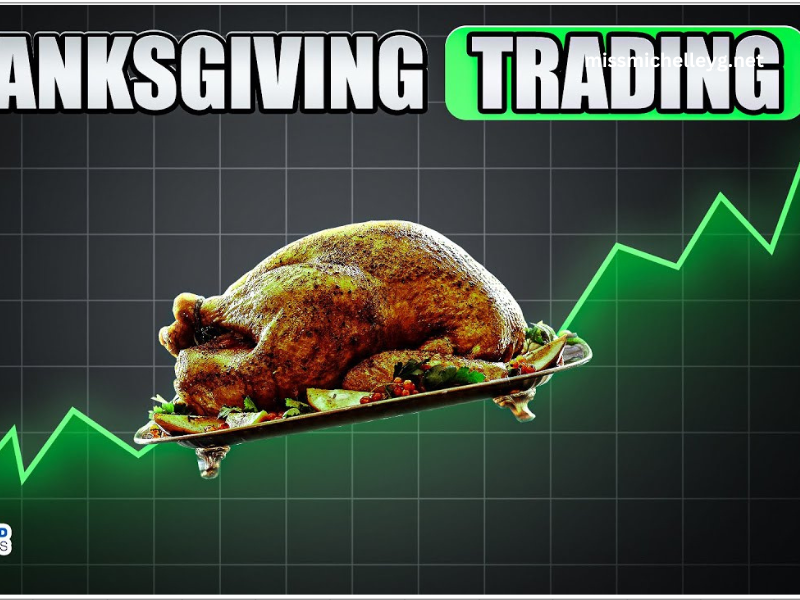The Forex market is known for its continuous operation, running 24 hours a day and five days a week. However, national holidays, such as Thanksgiving in the United States, can impact Forex market hours, trading volume, and liquidity. Understanding the Forex market’s operational status on Thanksgiving is crucial for traders who want to plan their strategies accordingly and avoid potential market disruptions. In this article, we will delve into whether Forex is open on Thanksgiving, what the holiday schedule means for different trading sessions, and how traders can optimize their strategies around holiday market closures.
Is Forex Open on Thanksgiving Day?
The Forex market is open globally, allowing traders access to foreign exchange across multiple time zones. Generally, the market is open from Sunday at 5:00 p.m. ET until Friday at 5:00 p.m. ET, providing an extensive trading window. While the Forex market doesn’t officially close for holidays like Thanksgiving, trading activity tends to reduce significantly due to lower participation from major financial institutions in the United States. Therefore, although technically open, Forex market conditions on Thanksgiving can differ markedly from regular trading days.
Thanksgiving Market Conditions
Thanksgiving in the U.S. is a national holiday observed on the fourth Thursday of November. On this day, the American financial markets, including the New York Stock Exchange (NYSE) and the NASDAQ, close, which directly influences the Forex market. The reduced trading volume can lead to limited liquidity and greater price volatility during this holiday period. Forex traders need to remain mindful of these factors and adjust their trading plans accordingly.
Impact of Thanksgiving on Different Forex Trading Sessions
Since Forex trading operates across four major sessions – the Sydney, Tokyo, London, and New York sessions – each with its own dynamics, the impact of Thanksgiving varies across these time slots:
Sydney Session (5:00 p.m. to 2:00 a.m. ET)
-
- The Sydney session experiences minimal impact on Thanksgiving, as it occurs in the evening hours following the U.S. holiday.
- However, due to lower trading volume from American traders, liquidity can be less than usual.Tokyo Session (7:00 p.m. to 4:00 a.m. ET)
- The Tokyo session typically sees reduced trading activity on Thanksgiving because of low participation from North American traders.
- While the session remains operational, the absence of substantial U.S. trading input can impact certain currency pairs, especially USD pairs.London Session (3:00 a.m. to 12:00 p.m. ET)
- The London session also experiences a slight drop in trading volume, with fewer U.S. traders participating.
- As one of the largest Forex trading hubs, London still maintains significant activity, though it is generally less volatile on Thanksgiving.New York Session (8:00 a.m. to 5:00 p.m. ET)
- The New York session is the most affected by Thanksgiving, as it coincides with the U.S. holiday.
- The market still operates, but major U.S. traders are mostly offline, reducing overall market liquidity.
- Traders should be cautious with trades involving the USD, as liquidity issues may lead to unexpected price swings.
Liquidity and Volatility Considerations
Thanksgiving creates a unique trading environment in Forex. With fewer traders, especially from the U.S., liquidity is limited. Here’s how traders should interpret these conditions:
- Lower Liquidity: With American financial institutions closed, fewer players are in the market, which can cause certain currency pairs to experience price gaps.
- Higher Volatility: Lower liquidity often leads to price instability, as fewer trades can cause prices to fluctuate more sharply than on regular days.
- Potential for Unexpected Spikes: Due to lower trading volume, even small orders can significantly impact prices, resulting in unexpected spikes that can either benefit or hinder a trading position.
Should You Trade Forex on Thanksgiving?
Trading Forex on Thanksgiving is a personal choice, but it requires understanding the risks involved. Here are some pros and cons to help you decide:
Pros of Trading Forex on Thanksgiving
- Less Competition: With lower trader participation, you might experience less competition, allowing more room for trading opportunities in certain markets.
- Potential Volatility Opportunities: Volatility is often high, which can be an advantage if you have strategies designed to capitalize on sharp price movements.
Cons of Trading Forex on Thanksgiving
- Increased Risk Due to Low Liquidity: Low liquidity means that even minor news events or trades can shift the market, potentially causing losses.
- Higher Spread Costs: With limited liquidity, Forex brokers often increase the spread, which can raise trading costs and reduce profitability.
- Unpredictable Price Movements: The market can become unstable, leading to unpredictable price fluctuations that are difficult to analyze accurately.
How to Adjust Your Forex Strategy for Thanksgiving
Traders who wish to remain active on Thanksgiving should consider adjusting their strategies to account for market irregularities. Here are some tips:
Focus on Currency Pairs with Lower U.S. Exposure
-
- Currency pairs like EUR/JPY or GBP/AUD are less influenced by the U.S. holiday, which can provide a more stable trading experience.Reduce Position Sizes
- Lower liquidity increases risk, so reducing position sizes can limit exposure and potential losses during unpredictable price shifts.Avoid Highly Volatile Instruments
- Avoid trading highly volatile currency pairs like USD/TRY or exotic pairs that may have erratic movements due to the lower volume.Use Limit Orders and Stop Losses
- Limit orders can prevent unexpected execution at unfavorable prices, while stop-loss orders help manage risk if the market turns unexpectedly.Monitor the Market Closely
- Staying vigilant and monitoring market movements closely on Thanksgiving can help you react quickly to any unexpected price changes.
- Limit orders can prevent unexpected execution at unfavorable prices, while stop-loss orders help manage risk if the market turns unexpectedly.Monitor the Market Closely
- Avoid trading highly volatile currency pairs like USD/TRY or exotic pairs that may have erratic movements due to the lower volume.Use Limit Orders and Stop Losses
- Lower liquidity increases risk, so reducing position sizes can limit exposure and potential losses during unpredictable price shifts.Avoid Highly Volatile Instruments
- Currency pairs like EUR/JPY or GBP/AUD are less influenced by the U.S. holiday, which can provide a more stable trading experience.Reduce Position Sizes
Post-Thanksgiving Forex Trading Patterns
Thanksgiving marks the start of the holiday season in the United States, which often results in a few days of unusual trading patterns in the Forex market. The day after Thanksgiving, known as Black Friday, is also a short trading day for U.S. financial markets. Here’s what to expect after the holiday:
- Black Friday Trading Conditions: Black Friday trading resumes in the Forex market but with reduced hours for other U.S. financial markets. This could continue to impact Forex liquidity and volatility, particularly for USD-related pairs.
- Year-End Market Behavior: Thanksgiving often initiates a period of reduced activity as year-end holidays approach, which means traders can expect continued lower liquidity and heightened volatility in December.
- Strategic Adjustments: Some traders reduce their activity between Thanksgiving and New Year to avoid the potential disruptions of thin holiday trading volumes.
Conclusion
Thanksgiving is a significant holiday in the United States, and while the Forex market remains technically open, trading conditions can be far from ideal. Low liquidity, unpredictable volatility, and higher spread costs are typical during this period. Traders should carefully consider whether the risks align with their trading goals and use strategies that mitigate potential downsides if they choose to trade on Thanksgiving. Adjusting trading tactics, focusing on less-affected currency pairs, and maintaining a vigilant approach can make a substantial difference in successfully navigating the Forex market on Thanksgiving.
For Forex traders, understanding holiday schedules and planning accordingly can lead to more informed decisions and better trading outcomes. The impact of Thanksgiving on Forex trading highlights the importance of adapting to seasonal shifts in market behavior, as these shifts can influence trading dynamics well beyond the holiday itself. Whether you choose to trade or take a break on Thanksgiving, a strategic approach will help you manage your trades more effectively during the holiday season.






